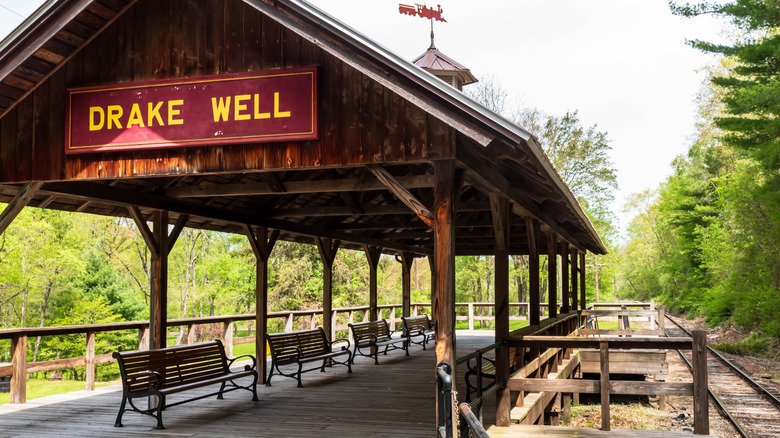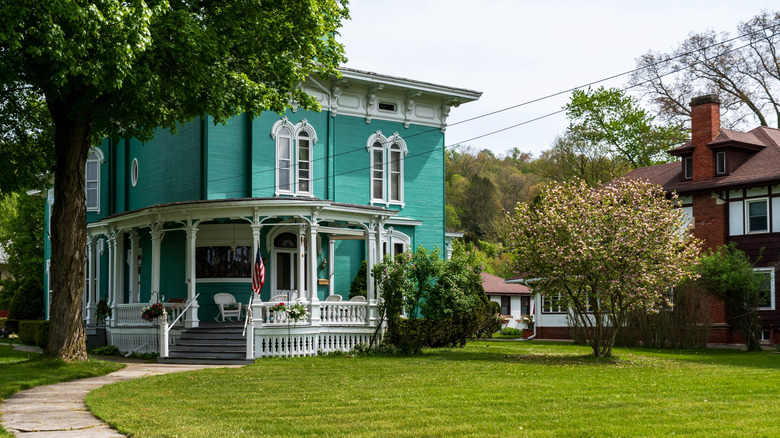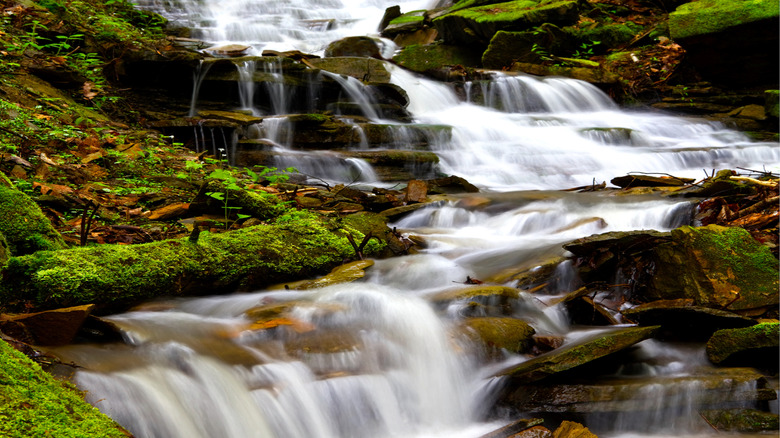The 'Birthplace Of The Oil Industry' Is A Pennsylvania City Blending Historic Train Rides And River Charm
The Commonwealth of Pennsylvania sits at the heart of some of America's most important achievements. The Keystone State is not only the birthplace of the Declaration of Independence and the U.S. Constitution (one of the 14 spots you can't skip on a trip to Philadelphia), but it also drove American industry forward nearly a century later. In 1859, black gold spouted from Edwin L. Drake's first oil well at Oil Creek in Western Pennsylvania, kickstarting an oil boom and fueling a new industry. The site of Drake's first oil well, just outside of Titusville, Pennsylvania, became the "birthplace of the oil industry" and began drawing in investors and speculators who sought their fortunes in the boom-and-bust oil industry. Moreover, it laid the groundwork for J.D. Rockefeller to establish Standard Oil in 1870 and to become the country's first billionaire.
Despite its industrial heritage, the city of Titusville, Pennsylvania, is charming and quaint; the town's wide streets remain lined with Victorian houses in the popular architectural styles from the mid-19th century as well as some of the region's finest buildings of its era. In the past, opera houses stood as symbols of opulence and wealth while two rail lines connected the city to major metro regions. More recently, a portion of the city was added to the National Register of Historic Places.
Even though Titusville was largely at the center of American industry, it rests in a quiet corner of northwestern Pennsylvania. No major interstate highways run through the city, though Pennsylvania Routes 8, 89, and 27 all meet in Titusville. From Pittsburgh, the nearest city with a major airport, it's just under a 2-hour journey north by car.
The model American city
As Titusville grew, it utilized a well-organized grid pattern and became a place where citizens began to add order after a chaotic boom and bust, making it a model city for the growing country. Today, the city still retains much of its charm from the past century via its walkable downtown. While you're strolling around, head to the Mercantile, a one-stop shop for food, coffee, and unique souvenirs, and locals and travelers alike rave about Coffee Days' açai bowls, incredible service, and, of course, their great drinks, as well as the homey café's atmosphere.
Train enthusiasts will love their time in the area not only for these five trains that offer some of the best views of fall but also for the other fun and charming railroad attractions in the region. For an incredible afternoon in Titusville, hop on the vintage Oil Creek and Titusville Railroad and learn about the region's storied history and tremendous natural scenery. During the 3-hour experience, you'll ride through Oil Creek Valley and Oil Creek State Park, where you'll likely see local wildlife. Don't miss sending a postcard home from the only post office on rails in the U.S.
If you've ever wanted to sleep in a train car but can't deal with the jostling as it rides the rails, Titusville has a solution. The pet-friendly Caboose Motel is a classic caboose that's been refurbished into a modern hotel room complete with WiFi! For dinner, head downtown to Maria's Italian Restaurant for some locally loved pizza and pasta, or stop by Fat Chad's Brewery and grab a cold beer, or even try wild game like elk if you're there on a Saturday.
Green and pure Oil Creek
In the past few decades, Oil Creek has transformed from being one of the most polluted streams in America to one of the most scenic and accessible waterways in the country. When you go, you'd never guess this is where the world's first oil well stood! The creek is a perfect spot for learning how to paddle, fish, or just spend a lovely summer afternoon on the water or a crisp autumn day looking at the beautiful leaves. If you lace up your boots and hit the trails, follow these clever tips to avoid ticks, which are present in the area.
As you explore the gorgeous Oil Creek State Park, you'll find multiple waterfalls, deer, waterfowl, herons, eagles, and even bears, as well as incredible bicycle and walking pathways. Former rail lines have been converted to hundreds of miles of paved cycling and footpaths that are part of the Erie to Pittsburgh Trail, making the park a great place to take a break as part of a longer ride or a great destination for a morning spin. If you'd prefer to backpack, be sure to register for a permit beforehand. For travelers interested in the history of the region, the park has a series of walking trails that explain the area's past on self-guided excursions. Hike through the site where Petroleum Centre, a rough-and-tumble ghost town, stood, though little evidence of that era remains apart from some stairs. Nature has made a tremendous comeback, so please, remember to leave no trace of your own visit.


